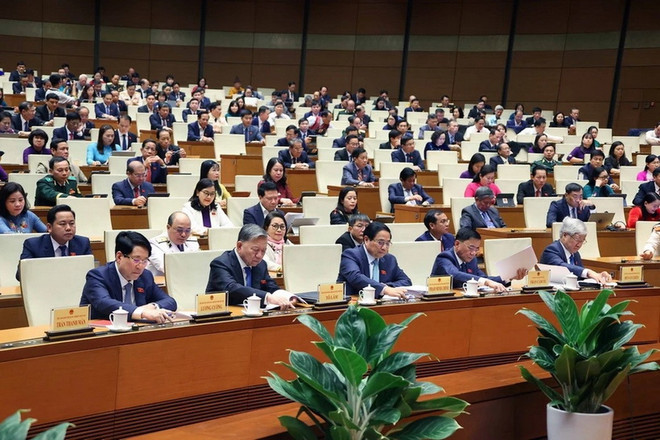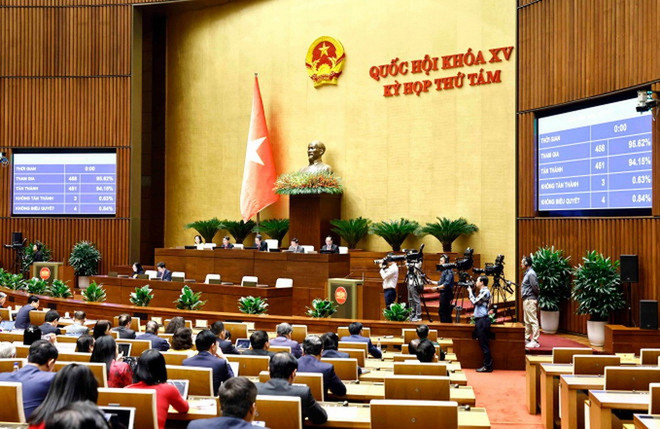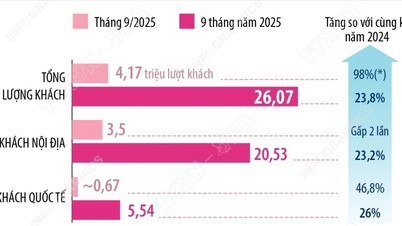At the 8th Session of the 15th National Assembly , the National Assembly passed the Data Law, which will take effect from July 1, 2025.
The Law consists of 5 chapters with 46 articles, regulating digital data; construction, development, protection, administration, processing, and use of digital data; National Data Center; national comprehensive database; digital data products and services; digital data management; rights, obligations, and responsibilities of agencies, organizations, and individuals related to digital data activities.
This is an important milestone, demonstrating Vietnam's determination to build a solid legal foundation to effectively manage, protect and exploit data - the country's strategic assets in the digital age.
Data is an important resource and means of production.
Speaking at the Congress to establish the National Data Association on March 22, 2025, General Secretary To Lam emphasized: "We are entering the dawn of the digital age, a period when data has become an important resource and means of production, becoming "new energy," even the "blood" of the digital economy .
Digital transformation, with data at its heart, is fundamentally changing the way we live, work and thrive."
The Data Law is an important step forward in shaping digital data management policies in Vietnam with the aim of ensuring security, protecting the rights of data subjects and promoting the development of the digital economy.

The Law defines the subjects of application as including Vietnamese agencies, organizations and individuals; foreign agencies, organizations and individuals in Vietnam; foreign agencies, organizations and individuals directly participating in or related to digital data activities in Vietnam.
One of the important objectives of the Data Law is to build a national database and data centers to serve state management. The Law also clearly regulates data management in the private sector, including data-related products and services.
This creates a specific legal basis for banks and information technology enterprises in collecting, processing and protecting customer data. The law encourages organizations and individuals to provide data to state agencies to serve the management and socio-economic development.
However, in some special cases such as emergencies, national security threats, disasters, riot prevention and control, terrorism, organizations and individuals are required to provide data upon request without the consent of the data subject.
This regulation helps the Government to quickly access and process important information when a serious incident occurs.
Data protection is one of the most important contents of the Data Law 2024. Data protection measures are clearly regulated, including developing data protection policies; strictly managing data processing activities; applying technical solutions to protect data; and training personnel to raise awareness of data security.
State agencies are responsible for ensuring data security in their management areas and establishing a unified data protection system nationwide.
Mr. Phan Duc Trung (Chairman of Vietnam Blockchain Association, Chairman of 1Matrix Company) and Mr. Nguyen Phu Dung (Executive Committee Member of National Data Association, Founder and Executive Director of PILA Group Joint Stock Company) shared the same opinion that the Data Law establishes a comprehensive and unified legal framework, regulating all activities of collecting, classifying, storing, exploiting, sharing and processing data, including cross-border data.
Not only is the Law a legal corridor for data collection, processing and sharing activities, it is also a tool to establish digital trust - a core element for the development of digital government, digital economy and digital society.
With many years of experience working in the field of finance and digital assets, Mr. Phan Duc Trung believes that the post-audit mechanism and the principle of "empowering" businesses in the process of building, deploying, managing and protecting data stipulated in the Data Law demonstrate the orientation of encouraging controlled innovation and enhancing business responsibility.
The Data Law is a strategic milestone in the process of perfecting the digital economic development institution in Vietnam, affirming the role and importance of data in the digital economy.
Mr. Phan Duc Trung believes that the Data Law will become a solid legal foundation for the sustainable development of the digital economy in general and the digital asset market in particular.
From the perspective of technology enterprises, Mr. Nguyen Phu Dung highly appreciated the orientation of the Data Law in promoting transparency, responsibility and equality in data processing. This is the premise for Vietnam to develop data economic models, protect digital sovereignty and proactively and sustainably integrate into the international community.
Building a sustainable and transparent digital economy
The Data Law comes into effect, opening a new chapter in creating a sustainable and transparent digital economy. In an era where data is the “raw material” of innovation and a strategic asset of the country, having a clear legal framework for managing, exploiting and protecting data is a prerequisite for developing the digital economy effectively and safely.

The law not only helps establish legal standards on the rights, obligations and responsibilities of stakeholders in the data ecosystem but also creates trust for businesses, investors and people when participating in digital activities.
In particular, when implemented in sync with mechanisms such as digital identification, open data sharing, and personal data protection, Vietnamese businesses believe that the Law will contribute to developing a safer and more transparent business environment, minimizing legal risks and costs.
In particular, compliance with personal data protection regulations will build trust among customers and users in cyberspace. For technology businesses, data is the core foundation of artificial intelligence and is considered a "gold mine."
Technology businesses can develop digital products and services with greater efficiency and speed.
“For technology businesses, the Data Law has a very clear, direct and long-term impact. The Law specifically stipulates the obligation to classify data (Article 13), identify and manage risks related to privacy and information security (Article 25), protect data (Article 27), and ensure data security (Article 43),” Mr. Phan Duc Trung shared.
According to Mr. Phan Duc Trung, 1Matrix is an enterprise that builds and operates a "Make in Vietnam" service blockchain network, providing comprehensive blockchain solutions for both the public and private sectors, and must strictly comply with the provisions of the Data Law.
In addition to investing in technology infrastructure, aiming to build a “Make in Vietnam” service blockchain network, from the very first day of establishment, 1Matrix has actively deployed technical infrastructure, designed data classification and management processes, and trained qualified staff to ensure strict and full compliance with legal regulations.
At the same time, with social responsibility and a pioneering role in the technology field, 1Matrix is ready to contribute to the development of technical standards, policy advice and expert training to work with management agencies to promote the development of a methodical, disciplined and sustainable digital economy.
“As a young technology enterprise, the National Assembly's passage of the Data Law further strengthens our strategic belief in using technology to create a safe, transparent and sustainable digital economy,” said Mr. Nguyen Phu Dung.
PILA's activities in the areas of digital data infrastructure, decentralized digital identity and data transparency are core areas directly regulated by the Data Law.
Therefore, Mr. Nguyen Phu Dung believes that when the legal framework becomes clear, consistent and oriented towards international standards, businesses will have a solid legal basis to invest and deploy new technology platforms.
More importantly, the Data Law demonstrates the State's commitment to promoting the data market, encouraging controlled public-private data sharing, and protecting people's privacy and digital identification.
These are the necessary conditions to form a responsible data ecosystem, helping solutions developed by PILA such as digital identification, cross-border data authentication, transparent and traceable data, etc. to maximize their value.
From the sharing of technology business leaders, it can be seen that the Data Law is a legal corridor that strongly promotes innovation, turning data into a circulating asset, creating value for all entities in the economy.
This is also the most important institutional foundation for private technology enterprises such as 1Matrix and PILA to proactively contribute and accompany the journey of creating the digital future./.
Source: https://www.vietnamplus.vn/luat-du-lieu-co-hieu-luc-tu-17-nen-tang-thuc-day-chuyen-doi-so-quoc-gia-post1047411.vnp




![[Photo] Binh Trieu 1 Bridge has been completed, raised by 1.1m, and will open to traffic at the end of November.](https://vphoto.vietnam.vn/thumb/1200x675/vietnam/resource/IMAGE/2025/10/2/a6549e2a3b5848a1ba76a1ded6141fae)

































































































Comment (0)